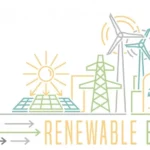ACME And IHI Ink Deal For Green Ammonia Supply

This decision follows ACME’s receipt of a subsidy for 90,000 mt/year of renewable hydrogen, granted as part of India’s Strategic Interventions for Green Hydrogen Transitions programme on 9 January
The Odisha project’s Phase-1 at Gopalpur, India, is expected to supply 400,000 metric tonnes of ammonia obtained from renewable sources annually. On 23 January, the Ministry of New and Renewable Energy in India announced that India’s ACME and Japan’s IHI had finalised an offtake term sheet.
The deal centres on the two businesses’ long-term cooperation along the whole value chain of renewable ammonia, from production to logistics. This ammonia is meant for use in power generation and other industrial uses with the goal of decarbonising processes, according to a statement from the ministry.R. K. Singh, the Union Minister for Power and New and Renewable Energy, highlighted India’s competitive advantage in the production of green hydrogen and ammonia, claiming that the nation is set to rank among the world’s top producers of these goods. The nation’s dedication to environmentally sustainable practices is emphasised by the minister’s remarks.
India is a cost-effective producer of ammonia and green hydrogen. However, compared to traditional ammonia prices, the cost of delivering green ammonia to the Asia-Pacific area is much greater. Platts, a division of S&P Global Commodity Insights, estimated in December that the average production costs of green ammonia shipped from the Middle East to Far East Asia were USD 795 per metric tonne. The price of conventional CFR ammonia from Far East Asia was USD 531 per metric tonne.The first phase of the 1.3 million mt/year renewable ammonia project in Odisha is set to be expedited by ACME Group in response to the increasing demand and in accordance with sustainable energy goals. By the end of 2026 or the beginning of 2027, the project hopes to be operational. This decision comes after on January 9 , India’s Strategic Interventions for Green Hydrogen Transitions programme awarded ACME a subsidy for 90,000 mt/year of renewable hydrogen.
With an average incentive of Indian Rupee 30/kg (36 cents/kg) over a three-year period, the subsidy highlights the government’s commitment to encouraging renewable energy sources and lowering carbon emissions.































































































































































































































































































































































































































































































































































































































































































































































































































































































































































































































































































































































